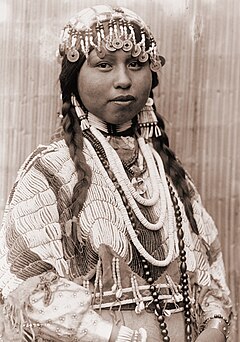
Wishram woman in bridal garb, 1910. Photo by Edward Curtis.
Wasco-Wishram are two closely related Chinook Indian tribes from the Columbia River in Oregon. Today the tribes are part of the Warm Springs Reservation in Oregon and Confederated Tribes and Bands of the Yakama Nation in Washington.
The Wishram and Wasco are Plateau tribes that are closely related and share many cultural aspects of the Northwest Coast tribes. They lived along the banks of the Columbia River, near The Dalles. The Dalles were a prime trading location, and the tribes benefited from a vast trade network. Unfortunately, the 1800s brought non-Indians and European diseases, which took a great toll on the Wasco and Wishram populations. Both tribes were forced by the United States in 1855 to sign treaties ceding the majority of their lands. These treaties established the Warm Springs Reservation.
Wasco comes from the word Wacq!ó, meaning "cup" or "small bowl," the name of a distinctive bowl-shaped rock near the tribe's primary historic village. They traditionally lived on the south bank of the Columbia River. In 1822, their population was estimated to be 900. They were divided into three subtribes: the Dalles Wasco or Wasco proper (a.k.a. the Ki-gal-twal-la on the south side of the Columbia River near The Dalles in Wasco County), the Hood River Wasco (on the Hood River or Dog River to its mouth into the Columbia River; Lewis and Clark grouped them with the White Salmon River Band and named them Smock-Shop Band of Chil-luck-kit-te-quaw, but they were two separate groups: White Salmon River Band in Washington and Hood River Band in Oregon, called Ninuhltidih (Curtis) or Kwikwulit (Mooney) and the Cascades Indians or Watlala (downstream from the other Wasco groups, two groups, one on each side of the Columbia River; the Oregon group were called Gahlawaihih [Curtis]). The Watlala, whose dialect is the most divergent dialect of the Wasco, may have been a separate tribe though identified as Wasco since 1830.
The Wishram are known as the Tlakluit and Echeloot. They traditionally settled in permanent villages along the north banks of the Columbia River. In the 1700's, the estimated Wishram population was 1,500. In 1962 only 10 Wishrams were counted on the Washington census.
The 1855 treaties signed by the Wasco-Wishram provide for the tribes to fish "at all ... usual and accustomed stations in common with the citizens of the United States..." Between 1938 and 1956, the Bonneville Dam, Grand Coulee Dam, and The Dalles Dam all wreaked havoc upon native fisheries. The government paid money to the tribes to compensate the loss of fish; however, that provided no compensation for the cultural and religious importance that fishing for salmon and steel head held for the tribe. In 1974 a landmark court case confirmed the rights of Northwest Coast tribes to fish as they have historically done.
The Wasco-Wishram language is part of the Upper Chinookan or Kiksht division of the Penutian language family. Currently, five elders from the Warm Springs Reservation are fluent speakers. The tribe has a language program to revive its use among tribal members of all ages.
Both tribes are known for their intricate wood carving, beadwork, and basketry. Wasco-Tlingit artist Pat Courtney Gold takes traditional Wasco-Wishram designs and weaves them into contemporary baskets.*
*https://en.wikipedia.org/wiki/Wasco-Wishram
BEN
Kin 13: Red Cosmic Skywalker
I endure in order to explore
Transcending wakefulness
I seal the output of space
With the cosmic tone of presence
I am guided by the power of navigation.
The purpose of the unified missions of the principle messengers was to establish a basis for the resurrection of earth and the evolutionary redemption of the human being.*
*Star Traveler's 13 Moon Almanac of Synchronicity, Galactic Research Institute, Law of Time Press, Ashland, Oregon, 2016-2017.
The Sacred Tzolk'in
Manipura Chakra (Limi Plasma)





No comments:
Post a Comment